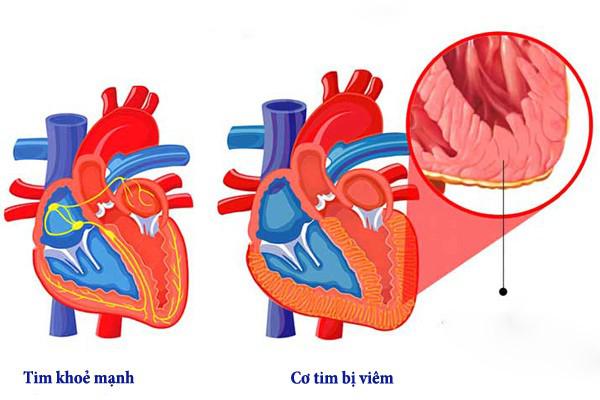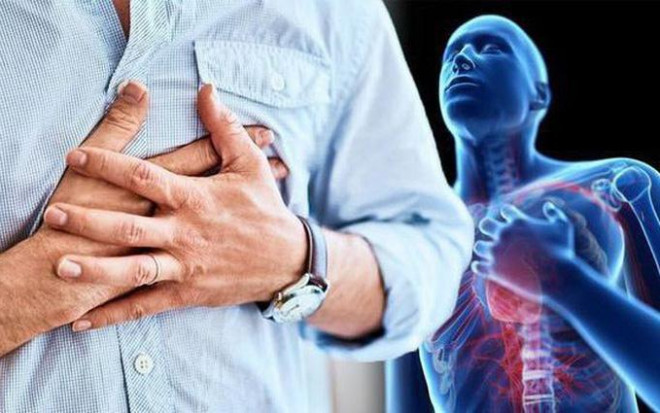Causes, manifestations and notes-Health life
Myocarditis is an inflammatory disease of the heart. This is a dangerous disease, usually occurring in healthy people, can lead to acute heart failure, death and complicated arrhythmias.
Acute myocarditis is inflammation of the myocardium, in which inflammatory cells are present simultaneously with myocardial necrosis in the same myocardial unit. It is estimated that more than 20% of patients with myocarditis may progress to dilated cardiomyopathy due to chronic inflammation.
1. Causes of myocarditis
There are many causes, of which the main cause of myocarditis is viral, bacterial, parasitic or fungal.
– Viral myocarditis
Viruses commonly associated with myocarditis include Coxsackievirus B, which can cause symptoms similar to a mild case of the flu, the viruses that cause the common cold (Adenovirus); and Parvovirus B19.
Gastrointestinal infections (Echoviruses), mononucleosis (Epstein-Barr virus), and measles (Rubella) are also causes of myocarditis.
Myocarditis is also common in people with HIV, the virus that causes AIDS.
– Bacterial myocarditis
Many bacteria can cause myocarditis, including staphylococcus, streptococcus, bacteria that cause diphtheria, Staphylococcus Aureus… can also cause inflammation of the heart valves and endocardium. Myocarditis also occurs in more than a quarter of patients with diphtheria caused by Corynebacterium Diphtheriae.
– Myocarditis due to parasites
Among these are parasites such as Trypanosoma Cruzi and Toxoplasma, including some that are transmitted by insects and can cause a condition called Chagas disease.
– Myocarditis caused by fungus
Some fungal infections of fungi such as Candida, Aspergillus and other fungi such as Histoplasma (commonly found in bird droppings) can sometimes cause myocarditis.
In addition, if exposed to toxic chemicals can also cause myocarditis. Some of the drug’s side effects have the potential to cause allergies or toxicity.

Myocarditis is an inflammatory disease of the heart.
2. Signs to recognize myocarditis
Symptoms of myocarditis can vary depending on the cause and severity of the disease. The most common signs and symptoms include:
– Vague chest pain
– Tachycardia or arrhythmia
– Shortness of breath, especially during physical activity
– Water retention, swelling of the legs, ankles and feet
– Tired.
In addition, in some patients with myocarditis, there are other signs such as fainting or sudden loss of consciousness, which may be associated with cardiac arrhythmias.
Other symptoms associated with viral infection include headache, aches, joint pain, fever, sore throat or diarrhea.
Myocarditis may be accompanied by pericarditis, pericardial effusion. Pericarditis often causes sharp pain in the center of the chest.
Myocarditis progresses through 3 stages:
– The initial stage of myocardial damage,
– The stage of immune myocardial damage,
– Finally, dilated cardiomyopathy.
Most patients have no signs of heart failure in stage I, so this stage goes unnoticed. After the first inflammatory lesion, stage II will initiate the post-injury immune response. Clinical manifestations begin to progress as a result of severe myocardial damage. In stage III, the typical picture and symptoms of postinflammatory dilated cardiomyopathy will be aggressive even though the inflammatory process has ceased.
In fact, many mild cases of myocarditis have no obvious symptoms. The patient had systemic symptoms of viral infection and was unaware that his heart was having problems. Some patients may not go to the doctor and recover on their own without knowing they have just had myocarditis.

Vague chest pain, heart palpitations, or arrhythmias are among the symptoms of myocarditis.
3. Diagnosis and treatment of myocarditis
After examination, clinical features of the electrocardiogram and cardiac enzymes suggest myocardial injury. Doctors will prescribe tests to help make an accurate diagnosis such as: Echocardiography, resonance imaging… Currently, cardiac MRI is used more and more in patients with suspected myocarditis.
In addition, doctors will biopsy the endothelium of the heart to make a diagnosis. Research results show that patients with myocarditis (identified by myocardial biopsy) have clinical manifestations similar to acute coronary syndrome, new-onset heart failure in 2 weeks to 3 months, chronic heart failure with onset. > 3 months…
The clinical picture of myocarditis is diverse and complex, depending on the extent of myocardial damage and the cause of each patient’s disease, doctors will have appropriate indications. The principle that the patient must limit physical activity. Avoid alcohol or alcoholic beverages, as this will aggravate myocarditis.
The recommended drugs are ACE inhibitors or receptor blockers, beta blockers and aldosterone antagonist diuretics. If the patient exhibits cardiac arrhythmias, consideration of antiarrhythmic drugs is necessary.
In addition, extracorporeal circulatory support devices (ECMOs) are indicated for acute myocarditis, cardiogenic shock and unresponsive to basic medical treatment. Mechanical circulatory support improves mortality in this group of patients.

There are many causes, of which the main cause of myocarditis is a virus, bacteria…
4. Doctor’s advice
– Myocarditis often has no specific symptoms… so if you suspect that you have abnormal health symptoms such as: fatigue, unexplained nervousness, chest pain, etc., you need to go to a medical facility for treatment. specific examination and consultation.
– The physical manifestations include symptoms of heart failure, cardiac arrhythmia and associated organ damage… Depending on the degree of myocardial damage, clinical disease is mild or severe, from no physical symptoms. , cardiogenic shock or multi-organ failure.
– Complications and prognosis of myocarditis depend on the cause of the disease, the degree of myocardial damage, clinical manifestations and disease stages.
Acute myocarditis is often prognostic, with about 50% of patients recovering after the first 2-4 weeks, about 25% having persistent cardiac dysfunction, 12-25% will die or progress. end-stage dilated cardiomyopathy.
– Patients, in addition to complying with prescribed medication, periodically re-examined should pay attention to avoid exertion for 6 months.
– Patient care is the most important factor: Nutrition needs to provide adequate energy for heart muscle cells, not to lower blood sugar.

Frequent hand washing is a very good measure to prevent myocarditis.
Bottom line: Myocarditis is not uncommon, and prevention is not easy, because there are many causes. Therefore, it is important to avoid contact with people who are infected with a virus or flu-like syndrome until they have fully recovered. Frequent hand washing is a very good measure to prevent disease. In addition, it is necessary to carry out recommended vaccinations, appropriate nutrition, exercise regularly … to improve health is also a preventive measure. |
at Blogtuan.info – Source: 24h.com.vn – Read the original article here



